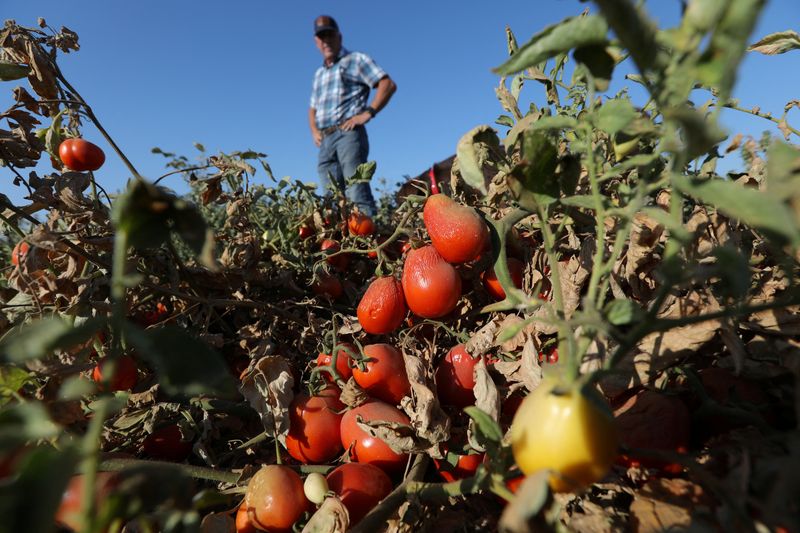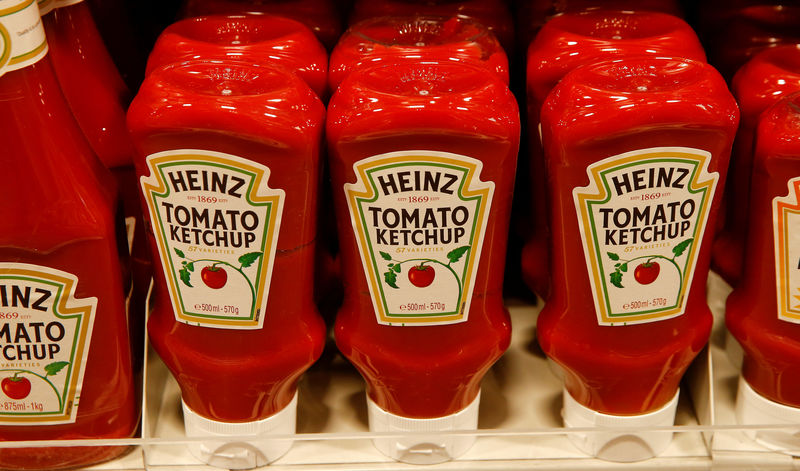By Nathan Frandino, Christopher Walljasper and Aude Guerrucci
FIREBAUGH, Calif. (Reuters) - A lack of rain and snow in central California and restricted water supplies from the Colorado River in the southernmost part of the state have withered summer crops like tomatoes and onions and threatened leafy greens grown in the winter.
That has added pressure to grocery prices, putting a squeeze on wallets with no end in sight.
The rise in food prices this year has helped drive U.S. inflation to its highest levels in 40 years. California's drought conditions, on top of Hurricane Ian ravaging citrus and tomato crops in Florida, are likely to push food costs even higher. Drought in an area known as the U.S. salad bowl has not only impacted fresh produce, but also pantry staples like pasta sauce and premade dinners.
"There's just not enough water to grow everything that we normally grow," said Don Cameron, President of the California State Board of Food and Agriculture. Cameron also grows processing tomatoes, onions, garlic and more than a dozen other crops near Fresno, California.
The most recent drought in California began in 2020, worsening when California's Central Valley faced its driest January and February in recorded history. Snowpack, supplying surface water for much of the Central Valley, reached just 38% of its historic average by April, according to the Sierra Nevada Conservancy, a state agency focused on conservation efforts.
Near Firebaugh, California, Aaron Barcellos planted just a quarter of the 2,000 acres of his family's fourth generation farm. This summer, he harvested tomatoes two weeks early to prevent further drought damage.
"I don't think farming in California has ever been more complex and more challenging, and the drought is a large part of that," said Barcellos.
California produces about 30% of the world's processing tomatoes, but in August the U.S. Department of Agriculture cut its 2022 forecast to 10.5 million tonnes, down 10% from its 12.2 million tonne estimate earlier in the year.
Because of the shortfall, farmers this year negotiated higher prices for tomatoes, as well as onions and garlic used for spices in countless boxed meals and other grocery store staples, Cameron said.
"What you're seeing harvested this summer, that really hasn't even hit the grocery shelf, is a 25% increase in the cost of the product to the processors – the canners, the buyers downstream," he said. "The onions and garlic have already been negotiated for 2023, with another 25% increase in price."
Cameron said tomato prices face a similar hike, resulting in a 50% increase in cost to canners and processors from 2021 to 2023.
Ketchup and other tomato-based pasta sauce maker Kraft Heinz (NASDAQ:KHC) Co said it's sourcing tomatoes from other regions to make up for California's shortfall.
A company spokesperson said Kraft could guarantee tomato supplies in grocery stores, but did not rule out price increases.
In southern California, Imperial Valley farmers are planting hundreds of acres of leafy greens to harvest this winter. The region faces water restrictions due to record low levels on the Colorado River, the source of water for both Imperial and Coachella Valley, the largest producer of dates in the U.S.
Jack Vessey grows lettuce, cabbage and leafy greens on more than 500 acres near Holtville, California, along the Mexico and Arizona borders. He currently has enough water for his crops, but worries that further cuts could leave his crops withering in the field.

Vessey normally plants alfalfa for livestock feed or durum wheat for pasta in January, but said he may fallow the land to save his Colorado River water allotment for higher value crops.
"That's our only water source. It's not just about agriculture," said Vessey. "You'd be killing a community."
